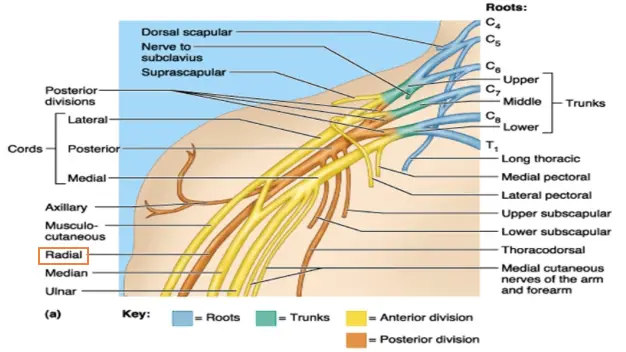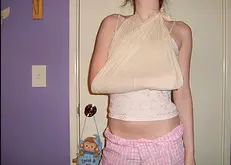Pinched Nerve in Shoulder Blade – A Quick Guide
If you have a rather aching and painful shoulder, chances are you are having a pinched nerve in shoulder blades. You could feel a discomfort when you move your arm or probably a throbbing pain in your muscle around the shoulder blade area. It could range from a very mild pain but can be very painful too.
When we talk about a pinched nerve, it means that some of your muscles and tissues are being put under a very strong pressure or some would call this condition a “trapped” nerve. It might just be a small issue at first, but if it goes on, it can cause severe problems such as disrupted nerve functions which will eventually lead to extreme discomfort and possibly numbness.
A pinched nerve is a condition where certain nerves are compressed. These are usually caused by the cartilage, muscles, bones or tendons that are close to the nerve. When you get a pinch, it doesn’t mean that the nerve is being pinched by the cartilage or tendons. Usually, the muscle tightens and creates complications in the shoulder area
It is very important that you identify the causes as well as the signs and symptoms so that you do not get it mixed up with other shoulder problems.
Contents
Causes of a Pinched Nerve in Shoulder
As stated before, pinched nerve in shoulder occurs when your nerves are compressed or put under severe pressure. This happens as a result of straining activities such as excessive exercise, long hours at work and extreme sports. Other causes include improper sleeping position and handling of heavy objects.
This medical condition is usually caused by the pinching of the nerves C5, C6, C7, and C8. If you are not familiar with the nerves, below is a diagram that illustrates each nerve and the area it affects (credits to Neck Pain Support).

- C5 – affects the shoulder area which can cause numbness and discomfort.
- C6 – affects the area of the arm ranging from the biceps till the thumb, numbness may be felt around the thumb area.
- C7 – affects the area of the arm towards the middle finger causing pain.
- C8 – affects the areas below the arm towards the little finger.
Signs and Symptoms of a Pinched Nerve in Shoulder
Mainly, there are 3 symptoms that can tell you if you are having a pinched nerve in shoulder.
- Firstly is numbness. When you get a pinched nerve in shoulder you might not be able to feel your arm. It is as though, you have lost your shoulder. It can occur anywhere around the shoulder depending on which nerve is pinched. Often you feel poking sensations when you get a pinched nerve in shoulder.
- Secondly, excruciating pain. This is very common when you get a pinched nerve in shoulder. You will feel pain around the shoulder area. You will feel pain as though you have broken your arm or your shoulder. The intensity of the pain varies according to which nerve is pinched.
- Thirdly is the feeling weak. Usually, when you experience a pinched nerve in shoulder, a muscle goes into a compressed state. So, you will feel weakness in your muscles when you get a pinched nerve in shoulder.
It is rather easy to spot a pinched nerve in shoulder. It is common to have pain and numbness around the shoulders towards the fingers. Depending on the nerve affected, the area of the pain varies. Tingly and poking sensations are common conditions associated with pinched nerves. The muscles are affected which can cause a weak arm. You might not be able to hold or grasp onto objects for a certain period of time. The elbows are sometimes affected too. Although not common in most cases, swelling may occur in certain areas where the nerve is involved.
Treatments
Treating a pinched nerve is somewhat easy if you know the steps and precautions to take. Usually, a pinched nerve will recover in a week or two if you do not perform intense activities and have enough rest.
First off, let’s have a look at what causes this problem to begin with before we go on to look at the type of treatment which can be useful. It usually occurs when excessive pressure is applied to the nerves around the sufferer’s shoulder blade. A common reason for this is the carrying out of strenuous psychical exercise such as long distance running, spending a lot longer than usual in the gym or the lifting of heavyweights. In other causes, poor postures can be the problem, and spending long hours in a badly adjusted office chair is one way in which many sufferers end up with this condition. It can also occur due to someone being overweight, which in turn causes the tissue surrounding the nerves in the shoulder to become pinched due to the pressure which is being constantly applied. It can, in some cases, also result from an existing medical complaint such as a herniated spinal disc.

This can result in pain and other symptoms such as weakness in the muscles, numbness or tingling in the neck, on the spine or along the shoulders. Along with the lower back and the neck, the shoulder area is commonplace to suffer from a pinched nerve. One thing to bear in mind is that the numbness or lack of sensation could happen in your arm, around your elbow or even in your hands. Occasionally the affected person may have some swelling along with the symptoms mentioned above.
The first step is to visit your doctor, as a pinched nerve shoulder issue can usually be diagnosed really quickly by a medical expert. The physician will probably ask you for specific details about when the pain began, where it is located and what type of discomfort you are suffering from. He will then no doubt ask you to carry out some movements to make sure of the diagnosis. A blood test may be requested but is not usually needed.
The most commonly suggested treatment is simply rest and physical restraint for a week or so. The doctor’s recommendations may include the suggestion that the patient with the pinched shoulder nerve sleeps on their back during this time or finds a way to keep their back straight while in bed, by methods such as by placing a pillow below their stomach area. If you are suffering from a good deal of pain due to the problem then an over the counter remedy such as that provided by the most common pain relieving tablets should be enough, although the doctor may offer a stronger solution in the event of serious pain. Some medical experts may also recommend massage or physical therapy as alternative solutions for those who want a quick healing process. The option of carrying out surgery to solve a pinched nerve shoulder injury is not usually necessary.
Home Remedies
There are some remedies that can be done at home to cure pinched nerve in shoulder. For example, using cinnamon and honey. We all know that these two remedies work for a lot of sickness and diseases so does it to a pinched nerve in shoulder. Just create a mixture of honey and cinnamon then apply it to your shoulder. After ten minutes, rinse with clean water.
WARNING: You might feel burning and your skin might redden because the cinnamon has an exothermic nature.
You can easily help to reduce the pain in your shoulder and arm by applying ice bags to the area involved. It will help soothe the pain and also the tingly feeling.
You should also sleep in a proper position by sleeping on your back. This will avoid any additional pressure on the nerves involved. This should help you to recover faster. Also, ensure that you perform your daily activities in a proper posture to avoid pain.
Exercises
There are a couple of exercises that you can perform to help reduce the pain and “freeing” your trapped nerves.
- Shoulder Shrugs – Make sure your arms are at your side. Move your shoulders up towards your face in a rotating manner. Perform about 15 times then take a short break and repeat.
- Extending your Chin – Place your hands on the back of your head. Slowly push your head so that your chin touches your chest and move it to the right. Repeat with the left side also.
Painkillers
There are quite a few painkillers that can be consumed to ease the pain. One of the most effective painkillers is Tylenol. If you have just a mild pain, you can just have a dose of Paracetamol. These painkillers can easily be obtained from most pharmacies.
It is always recommended that you receive professional consultation from physicians or doctors if the pain continues. You will most likely be given a stronger painkiller. Other than that, therapy and massage sessions might be conducted. Although very rare, surgery might be performed if a symptom persists.
Read: How To Deal With Upper Back Pain Between Shoulder Blades
Featured Image Source: kxyorkville
Pinched Nerve in Shoulder Blade – A Quick Guide, Last Updated: 18/3/2018



Pingback: Pinched Nerve in Shoulder Blade Treatment at Home